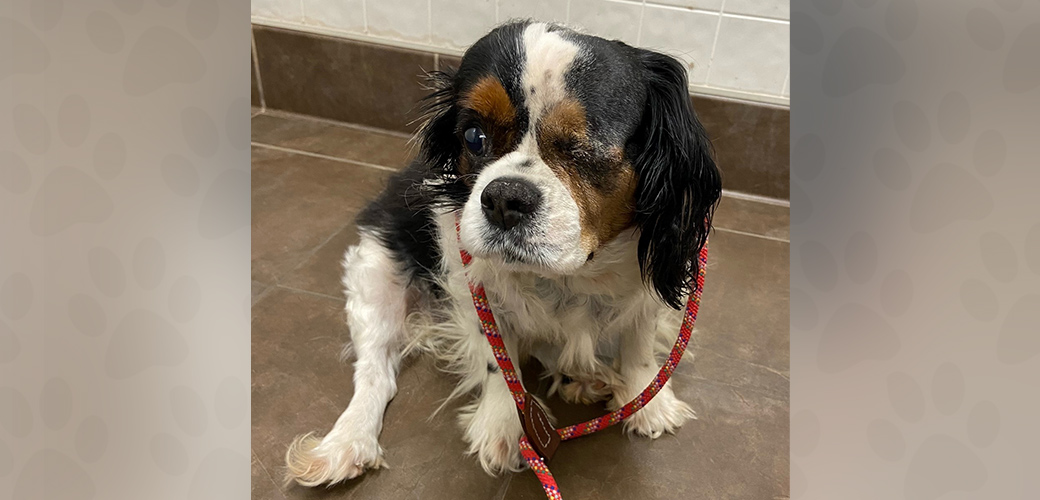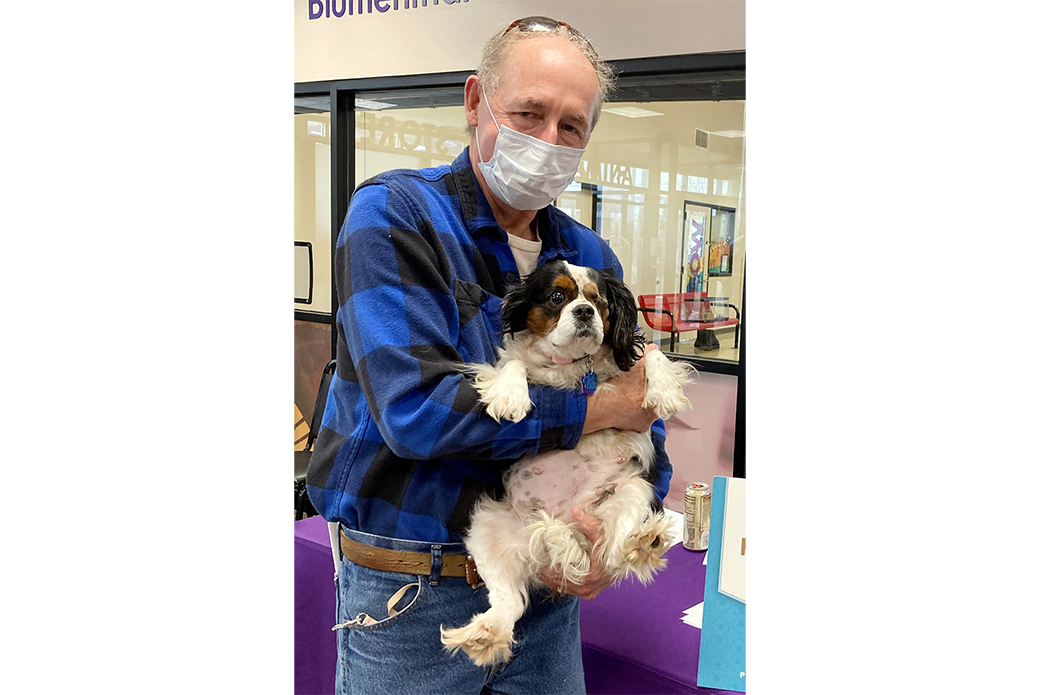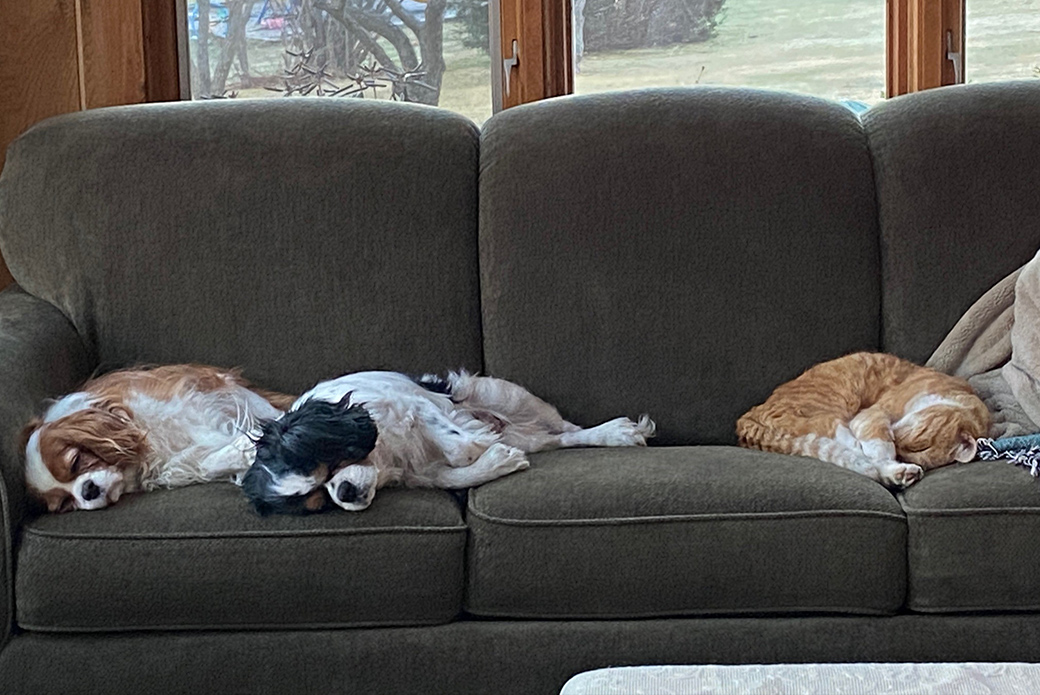


November 24 was a busy day at the Animal Rescue League of Iowa (ARL), as 39 of their animals found new homes. Among the adoptees was Roxie, a Cavalier King Charles Spaniel who was rescued by the ARL last October during a multi-phased rescue of 500 dogs from a breeder in Seymour, Iowa.
Supported by a $100,000 grant from the ASPCA, the ARL oversaw the rescue and temporary sheltering operation, taking in 115 dogs. Other dogs were transported to partner shelters in the region and to the ASPCA Cruelty Recovery Center (CRC). The ASPCA’s support included operational planning, field logistics and operations, animal transport, forensic exams, investigative and legal assistance, on-site medical care, and placement, as well as shelter set-up, supplies and personnel.
While Roxie was skittish, her biggest challenges were medical.
“She was in rough shape,” says Jessica Jorgenson, ARL’s Digital Content Manager. “She had one ear missing, an injured eye, diseased teeth and a heart murmur.”
Veterinarians at the ARL removed Roxie’s left eye, extracted seven teeth, and spayed her. Fortunately, her heart murmur did not require treatment.
AWA Violations Prompt A New Bill
The breeder in Roxie’s case was licensed by the U.S. Department of Agriculture (USDA), which is tasked with ensuring that animals raised in commercial breeding facilities are protected against harm and neglect.
Even though USDA officials were denied access on several occasions to inspect the facility—a requirement for maintaining a license—they continued to renew the breeder’s license. It wasn’t until the USDA documented more than 200 violations of the Animal Welfare Act—including dangerous housing, lack of records, matted and emaciated dogs, dead and decomposing dogs on the property and dogs with untreated medical issues—that they finally opened a case against the breeder, who eventually agreed to surrender all the animals.
In December, in response to the ongoing pattern of USDA’s failure to enforce the law, U.S. Reps. Cindy Axne (D-Iowa), Brian Fitzpatrick (R-Pa.), Mike Quigley (D-Ill.), Nicole Malliotakis (R-N.Y.), Susan Wild (D-Pa.) and Vern Buchanan (R-Fla.) introduced Goldie’s Act, a federal bill to amend the Animal Welfare Act (AWA) to ensure it better protects dogs in breeding facilities.
Goldie, for whom the bill was named, was a Golden Retriever raised in the same facility as Roxie. She died at the breeding facility after suffering months of extreme neglect.
“Goldie was left to endure prolonged and extreme suffering, and her tragic death is a direct result of the USDA’s failure to fulfill its responsibility under the law to protect dogs who are bred and warehoused for the pet trade,” said Matt Bershadker, CEO of the ASPCA,which strongly supports Goldie’s Act. “Thousands of other dogs are still living in horrific conditions without adequate access to food, water, veterinary care and exercise, while the USDA stands idly by, allowing violations to go unreported and unpunished.”
By helping protect animals in commercial breeding facilities, Goldie’s Act would also support local shelters.
“Shelters like ours are often tasked with cleaning up the USDA’s mess when they fail to enforce the law,” explains Tom Colvin, CEO of the ARL, which also employs a full-time Animal Welfare Intervention Coordinator who works with law enforcement across the state on cruelty, hoarding and puppy mill cases. “Like other shelters, ours deals with a large population of homeless pets, and animals from these cases present unique challenges given their severe medical and behavioral issues and the costs associated with those.”
Bringing Roxie Home
Soon after Roxie was made available for adoption, the ARL posted Roxie’s photo on their website.


Tom and Roxie at the Animal Rescue League of Iowa
“We had watched the news about the rescue and saw the kennel full of Cavaliers,” says Jane C. She and her husband Tom are experienced foster caregivers. They reached out to the ARL to adopt a dog from the case.
“We usually look for older animals who aren’t as likely to be adopted,” says Jane. The couple, who have adopted dogs from the ARL in the past, has another rescued Cavalier King Charles Spaniel named Boo.
After seeing Roxie’s photo, Tom visited the ARL. He took a photo of Roxie and phoned Jane.
“Tom said, ‘She’s pretty shut down,’” says Jane. “I asked Tom, ‘What do you want to do?’ Tom said, ‘I want to bring her home.’ So I said, ‘Then bring her home.’”
New Name, New Life
Roxie, now named Bailey after Jimmy Stewart’s character in ”It’s a Wonderful Life,” responds to her name and is learning commands.
“You have to appreciate her enthusiasm, learning how to have fun,” says Jane, adding that Bailey has adjusted to having one eye but walks “kind of sideways.”


Roxie, now Bailey, and Boo at home
“You can tell she’s never been in a home before. She’ll walk across the coffee table and is puzzled by mirrors.”
Bailey and Boo get along well with each other, as well as the family cat, Boy. Both dogs are a delight for Jane and Tom’s 11 grandchildren who range in age from one to 10 years.


Bailey with Tom
Jane and Tom are working on housetraining Bailey and rewarding her good behavior. “Bailey was once afraid to take a treat from our hands, but she will now, no problem,” says Jane.
Jane says the key to helping Bailey adjust and build trust is patience.
“Animals who come from situations like this are traumatized,” she says. “We are meeting her where she is, not where we want her to be.”


Boo, Bailey, and the family cat, Boy
Although Bailey’s story has a happy ending, many animals from breeding facilities like hers do not.
“A new approach of stopping bad breeders before animals suffer is long overdue,” says the ARL’s Tom Colvin. “We thank our partners who put an end to this operation, and we look forward to making large-scale change in the future.”
Animals kept under our federal government’s authority must never be left to suffer and die, which is why we are calling on Congress to pass Goldie’s Act to ensure that the USDA is doing its job and protecting the animals in their care. Use our online form to contact your U.S. representative today and urge them to support Goldie’s Act.
Source: Read Full Article